Haitian Journalists Protest Police Brutality (original) (raw)
Dozens of journalists, lawyers and former police officers held a peaceful march around Haiti's capital, Port-au-Prince, Thursday to denounce police brutality.
Some of the protesters held photos of reporters who had been injured while in the line of duty. Others held posters depicting scenes of police brutality during demonstrations.
As they made their way around town, they chanted, “When they don’t get paid, we’re the ones they call!” a reference to the role journalists often play giving a voice to citizens’ efforts to hold the government accountable.
Members of the Haitian media allege they are often targeted by aggressive law enforcement officers while covering protests and other news events. They say they also face intimidation and death threats.
“I think the point of this protest is to say journalists' rights must be respected. That is what we are fighting for. That is our objective," Radio Zenith reporter Robeste Dimanche told VOA.
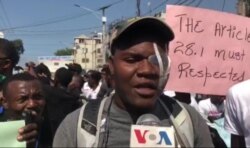
Impartial Info reporter Daniel Lamartiniere said he's a victim of police brutality. (Matiado Vilme/VOA)
Daniel Lamartiniere, a reporter for Impartial Info, told VOA he is a recent victim of police brutality.
"On Wednesday January 20, 2021, I was ... doing a live update when I saw a policeman in a beige and blue uniform start shooting. When I realized he was firing a gun, I ran for cover so I wouldn't get shot. But I miscalculated (in choosing) a shelter because that is exactly where a rubber bullet hit me in the eye," he said.
Lamartiniere had a plastic shield over his left eye as he spoke to VOA.
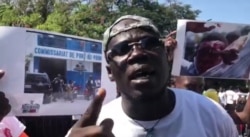
Haitian journalist Robeste Dimanche works for Radio Zenith in Port-au-Prince. (Photo: Matiado Vilme / VOA)
Complaints about abuses
Dimanche told VOA he delivered a letter on behalf of the journalists to the Office for the Protection of Civilians (OPC) before the protest started to complain about police brutality. Dimanche said he spoke to Jacques Desrosier, the official responsible for human rights issues, and was well-received.
"I think that (the) OPC is going to act on the message we delivered. And what we asked for is what we have been asking all along — we denounce police brutality. We listed the barbarian acts committed by police against journalists, and that's basically what is contained in our complaint,” he said.
In an exclusive interview with VOA, Haitian Ambassador to the United States Bocchit Edmond said he was surprised to hear police were deliberately targeting reporters covering protests.
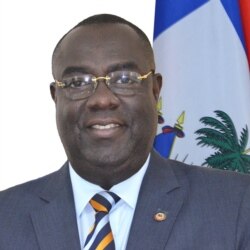
FILE - Bocchit Edmond, Haiti’s ambassador to the United States. (Twitter)
Protesters and journalists, including VOA Creole reporters in Port-au-Prince covering the demonstrations, say police often target them with tear gas and behave aggressively toward them, despite no evidence of illegal behavior on their part.
"We will always support the right of the people to protest peacefully on any issue, because this is a right recognized by the constitution," Edmond told VOA. "But any society in any country, whenever protesters are trying to behave in a disorderly manner — burning public goods, burning public property — the police has to step in and put a stop to it."
Edmond advised victims of aggression to file a complaint with the PNH (national police) inspector general’s office.
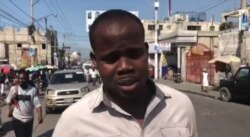
Vision 2000 reporter Leon Kersivil says it was important for him to protest because some of his colleagues are among the victims. (Photo: Matiado Vilme / VOA)
Leon Kersivil of Radio Vision 2000, told VOA it was important for him to participate in the protest because the list is long of colleagues who are also victims.
"There are many journalists I can name, such as our colleague Reginald Remy from (radio-television) Caraibes FM, who was shot multiple times by police with rubber bullets in the Carrefour Aeroport (neighborhood of the capital). There are many other journalists who have been victimized," he said. "Today, this march is our way of demanding justice, as well, for all members of the press who have been victims of criminal acts.”
Remy was covering an anti-government protest and wearing a press badge when he was shot and wounded in the arm by police using rubber bullets.
Press freedoms eroded
Press freedom deteriorated substantially in Haiti in 2020, according to Reporters Without Borders (RSF), which described working conditions for journalists as “dangerous and precarious.”
On a scale of one to 100, the Caribbean nation's ranking fell from 62 in 2019 to 83 in 2020. RSF's annual report cites multiple factors for the deterioration, including corruption and increasing hostilities.
The Committee for the Protection of Journalists (CPJ) and RSF have called on the Haitian government to investigate attacks on journalists.
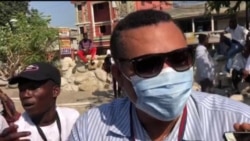
Magik 9 radio reporter Robenson Alphonse says law enforcement must act professionally and follow the law. (Photo: Matiado Vilme/VOA)
Reporter Robenson Alphonse of Magik 9 FM was covering the protest and lending support.
"We insist that law enforcement must be professional and follow the law when they interact with journalists who are covering protests," he told VOA. "Just as the Association of Haitian Journalists has deplored the aggression toward the Radio-TV Caraibes journalist, I believe we must remind people that it is necessary to protect the press and act responsibly always. This is fundamental, and that is why I'm participating in this protest."
The march ended peacefully without incident or police interference, according to the VOA Creole reporter who covered the event.